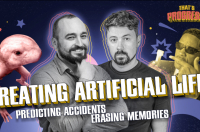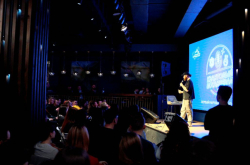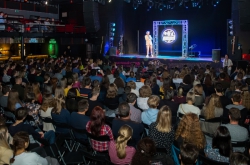First grant is like a first love
Getting your first research grant is like experiencing all the pains and difficulties of a first love, as the guests were assured by the first performer, George Zograf, a PhD student at the Faculty of Physics and Engineering. How to present yourself to scientific foundations, how to get a response, how to interact with colleagues sharing a grant, how to entertain yourself on the grant’s money and how to behave if you didn't get a grant? Everything is just like in a real relationship.
"Each scientific foundation has its own website. Each scientist has a personal page there. There you describe your education, scientific degree, interests, psychological age, karma color... It’s like Tinder for scientists. And this is not an accidental comparison: in fact, according to statistics, scientists think about grants 40 times a day on average."
"Scientists edit their profiles depending on the grant's subject. For example, today you’re looking for money to fry up a bit of silicon with a burgundy-colored laser. And tomorrow you’re seeking a partner for serious fundamental research. Some like to have a few small grants - these are like quick, shoreside intrigues of seamen, while others take mega-grants - this is more like a wife, a house, a mortgage...”

There's a common question that scientists ask each other: "Do you check out other grants on the Internet?” Sometimes, a colleague comes up to you and says: "I’ve hardly seen you since you got that new grant! I have one too, you know!" All in all, this causes grudges all the time.”
"Writing a grant application is like talking to your girlfriend's parents. It all starts with easy questions from her mother: "Where did you study?", "What is the topic of your research?" And then her dad comes with the heavy artillery: "What results do you expect to get in three years?" It's like asking when the wedding is."
"Fill the grant application as soon as possible. According to an unspoken rule of our university, the one who signed the application last takes all the applications from the university to Moscow. When it happened to me, a colleague recommended not to forget my international passport. At first, I did not understand why. But then I put two and two together: several dozens of applications are six-figure sums. Who knows what could happen on the way? "
"Waiting for a response from a scientific foundation is like texting a girl. The answer comes about four months later. And a grant never texts you first. So you text her: "Want to go skating?" Four months later she texts you that she can’t. And then you see her with some other guy in her profile picture. It’s the same feeling as when you receive an answer from the fund that your application didn’t get approval. "

"When grants come to an end, many report great results and remain friends. But sometimes your report is not good enough, and you are asked to return the money. Recently I applied for a new grant and paid more attention to it than the rest, and I have a feeling that this one may be the grant I’ve been waiting for."
Being an experimental scientist is going to the market with uranium glass in your pocket
Laboratory experiments are the most "vital" part of science, in which scientists not only reproduce it in reality but also go to markets for spare parts, argue with theorists and childishly rejoice in seeing images of sprawling atoms. Vladimir Borisov - PhD student at the Department of Photonics and Optical Information Technologies of ITMO University told us how scientific discoveries actually happen.
"Laboratory experiments are usually successful. But many argue with this: people who refuse to give me grants, theorists. Have you watched "The Big Bang Theory"? Remember how Sheldon constantly scoffs at Leonard? The same happens in real life: theorists hold experimentalists cheap, not considering what we do science. I can understand them: I do not accept the life they are living as real. "

"Theorists are just jealous of experimentalists: their work is important and interesting, but so boring! But experimentalists are the life of the party. At one of our parties, we decided to assemble a Wilson camera, which allows you to see the traces of elementary particles with your own eyes. We found everything we needed in the studio on Rybatsky except for one: the source of said particles. We had to bring a piece of uranium glass from the laboratory. What kind of theorist could boast having had a piece of uranium glass in his pants? "
“Every experiment begins with a theory. But there is a problem: there are not enough theorists, or not all of them are good enough. They often want to catch you and show you where you are wrong. In this case, theorists are like traffic cops: they hide in a vulnerable place, suddenly jump out, and hit you with a fine. And you can’t strike a deal with them either. Finding your theorist is like finding a soul mate. Therefore, sometimes experimentalists have to take on the functions of a theorist. But a formula is for an experimentalist what a light is for a bat.”
"To assemble a setup for an experiment that would meet all the quality standards, we can go to a website of an American company and order equipment there and wait for six months for it to come. But since we usually do not have any money, we are guided by the principles of imports phase-out and find everything we need in Russia, or more precisely, at "Yunona" flea market. The southwest of St. Petersburg is a mecca for Russian scientists. We'll go there to buy a broken CD drive, a couple of hard drives, and a soldering iron to heat crystals. I saw a five million dollar Swiss laser placed on some car tires in a laboratory once! Imagine my surprise."

"You experience childish joy when your experiment ends successfully. You scan the pictures of crystals in which the atoms began to disintegrate like you wanted and run to show these pictures to colleagues. Often they look at you like a moron, and say: "So what?" Or worse, someone gets out their smartphone and shows you in response a picture of a very large pigeon, which he saw today. We rejoice at the results of our experiments as children, and people perceive us appropriately. "
"Sometimes experimentalists behave seriously. This is when their experiment fails. Then we become the most serious scientists in the world, and colleagues around us begin to mirror us and think about it too. What went wrong in the experiment? At such times, you want to swear: because we are tormented by difficult questions that have nothing to do with science. We realize that if we do not understand what exactly went wrong right now, then we will have to go to Yunona and talk to the theorists again. "
About "Quantum Potential"
Other performers at the first-ever “Quantum Potential” included Professor Alexander Chirtsov, who jested about holographic lasers, and stand-up artist Seva Moskvin, who is also a graduate of St. Petersburg State University, who talked about why it's difficult and yet cool to be a humanities graduate.
The first scientific stand-up club was invented for those who like to watch stand-up comedy, but also don’t mind learning something new about science. This way science can be made popular among those who may not have previously attended lectures at other popular scientific events such as "Kurilka Gutenberga" or Science Slam, explained Alexander Gostev, a public relations specialist at ITMO’s Event Management Office.

"What’s said here will be clear to those who are not very familiar with science, and those who have just started to get into it. The idea came to us last summer after one of the lectures. Our professor Alexander Chirtsov’s speech was more like a stand-up than a lecture, although the speech was very scientific. That was the beginning of the scientific stand-up format: as simple as possible, but adherent to the stand-up canon - more punchlines, fewer presentations" - he explained.
A new “Quantum Potential” is expected to happen once every three months. What is more, it will feature scientists from other universities: guest performers from the Moscow Institute of Physics and Technology, the European University, and other universities have been invited to future shows. In addition, everyone interested in being a part of the show can send an application to the Strategic Communications Department of ITMO University.
Translated by Pavel Vorobyev




